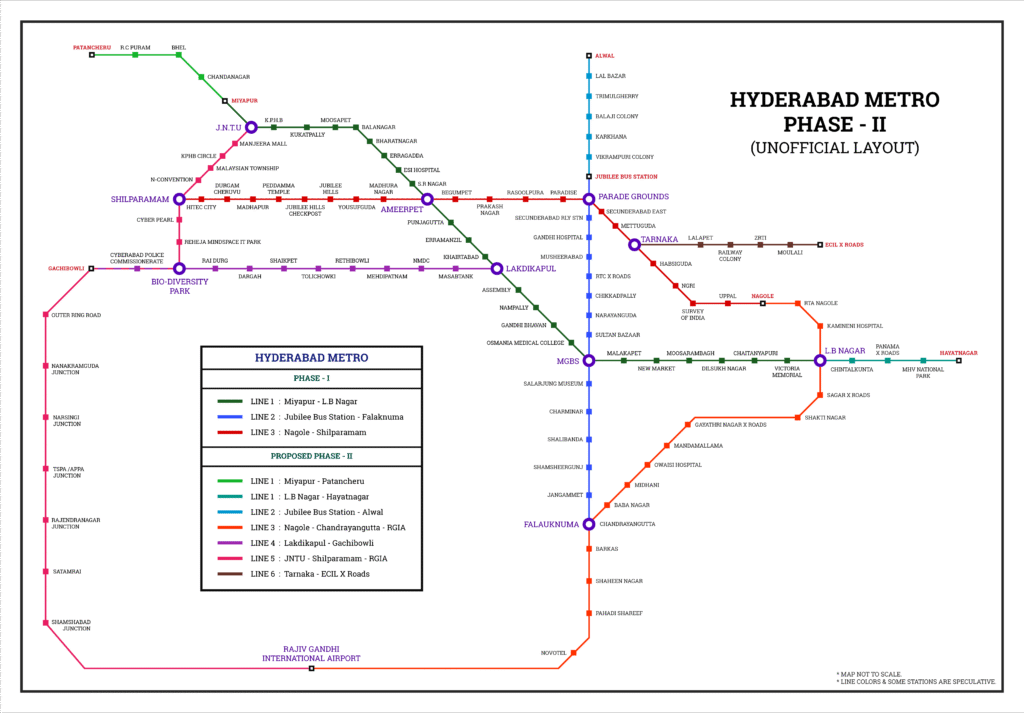Hyderabad, one of India’s fastest-growing cities, is set to witness a significant transformation in its public transportation landscape with the upcoming Phase 2 of the Hyderabad Metro Rail project. This ambitious expansion aims to enhance connectivity, reduce traffic congestion, and promote sustainable urban development.
What is Hyderabad Metro Phase 2?
Hyderabad Metro Rail Phase 2 is an extension of the existing metro network, designed to cover an additional 76.4 kilometers across five new corridors. The project is expected to serve approximately 8 lakh passengers daily upon completion, significantly easing the city’s traffic woes .

Key Corridors in Phase 2
1. Corridor IV: Nagole to Rajiv Gandhi International Airport (RGIA)
This corridor will connect the city center to the airport, facilitating seamless travel for both domestic and international passengers. It will be a mix of elevated and underground sections, with 24 stations, including one underground station at the airport .(hmrl.co.in)
2. Corridor V: Raidurg to Kokapet Neopolis
Connecting the IT hub of Raidurg to the emerging business district of Kokapet, this corridor aims to cater to the growing demand for efficient transportation in the western part of the city .(hmrl.co.in)
3. Corridor VI: MGBS to Chandrayangutta
This extension of the existing corridor will enhance connectivity in the Old City, providing better access to key areas and promoting inclusive urban development .(hmrl.co.in)
4. Corridor VII: Miyapur to Patancheru
Linking the northern suburbs to the industrial hub of Patancheru, this corridor aims to serve the growing population in these areas and facilitate smoother transit for daily commuters .
5. Corridor VIII: LB Nagar to Hayatnagar
This corridor will connect the southeastern parts of the city, improving accessibility and reducing travel times for residents in these areas .

Project Cost and Funding
The total estimated cost for Phase 2 is ₹24,269 crore. The funding is structured as follows:(Deccan Chronicle)
- State Government (30%): ₹7,313 crore
- Central Government (18%): ₹4,230 crore
- Loan Component (52%): ₹12,726 crore, to be raised from multilateral agencies like JICA and ADB .(Deccan Chronicle, The New Indian Express, The Hindu)
Timeline and Implementation
Construction for Phase 2 is scheduled to commence in January 2025, with the Old City Corridor (MGBS to Chandrayangutta) being the first to begin. The entire project is expected to be completed within four years .(hmrl.co.in, Deccan Chronicle)
Expected Benefits
1. Enhanced Connectivity
Phase 2 will integrate various parts of the city, providing residents with efficient access to key areas, including the airport, IT hubs, and industrial zones.
2. Reduced Traffic Congestion
By offering an alternative mode of transportation, the metro will alleviate pressure on the city’s roads, leading to smoother traffic flow and reduced travel times.
3. Environmental Sustainability
As a clean and energy-efficient mode of transport, the metro will contribute to reducing the city’s carbon footprint and promoting sustainable urban mobility.
4. Economic Growth
Improved connectivity will attract investments, boost tourism, and create employment opportunities, contributing to the city’s economic development.
Challenges and Considerations
While the project promises significant benefits, it also faces challenges such as land acquisition, potential displacement, and the need for effective coordination among various stakeholders. Addressing these issues proactively will be crucial for the successful implementation of Phase 2.
Future Outlook
Upon completion, Phase 2 will significantly enhance Hyderabad’s public transportation infrastructure, making it one of the most advanced metro systems in the country. The integration of these new corridors with the existing network will provide residents with a comprehensive and efficient transit system, fostering sustainable urban growth.
Frequently Asked Questions (FAQs)
- What is Hyderabad Metro Phase 2?
- An extension of the existing metro network, covering 76.4 km across five new corridors.(Deccan Chronicle)
- When will Phase 2 construction begin?
- Scheduled to commence in January 2025, with the Old City Corridor starting first.(hmrl.co.in)
- What is the total cost of Phase 2?
- ₹24,269 crore.(The New Indian Express)
- How many passengers is Phase 2 expected to serve daily?
- Approximately 8 lakh passengers.
- What are the key corridors in Phase 2?
- Nagole to RGIA, Raidurg to Kokapet, MGBS to Chandrayangutta, Miyapur to Patancheru, and LB Nagar to Hayatnagar.(Deccan Chronicle)
- Who is funding the project?
- The state government (30%), central government (18%), and loans from multilateral agencies (52%).(Deccan Chronicle)
- How long will it take to complete Phase 2?
- Expected to be completed within four years from the start of construction.
- Will the metro be elevated or underground?
- Most sections will be elevated; however, some parts, like the airport corridor, will have underground sections.(hmrl.co.in)
- How will Phase 2 impact traffic congestion?
- By providing an alternative mode of transport, it will reduce pressure